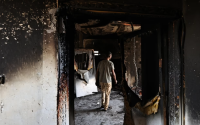31 May 2007Yahoo! NewsBen Fox
The detainee who died at Guantanamo Bay in an apparent suicide was identified Thursday as a Saudi military veteran and self-described Islamic holy warrior who denied he ever intended to kill Americans.
U.S. military records show the detainee admitted having a connection to al-Qaida but insisted he was little more than a Taliban foot soldier when the U.S. invaded Afghanistan following the Sept. 11 terrorist attacks.
The military and Saudi Arabia identified the detainee as Abdul Rahman Maadha al-Amry. Though it gave no details about him, U.S. records say he was 34 and had been held without charges at the prison at the Guantanamo Bay naval base in southeastern Cuba since February 2002.
Al-Amry had no attorney of record, although the New York-based Center for Constitutional Rights has filed a blanket legal challenge on behalf of all Guantanamo detainees. Lawyers say many detainees have little faith in the American legal system but others simply do not understand it.
"People just don't know where to turn so there are absolutely people in Guantanamo who want a lawyer but don't have one," said Zachary Katznelson, an attorney for the British human rights group Reprieve, which represents 37 detainees.
The U.S. military said al-Amry was not breathing when he was found Wednesday by guards in Camp 5, a modern, high-security section of Guantanamo generally reserved for detainees who are considered to have intelligence value or who do not follow prison rules.
Al-Amry was said by another detainee to have been on a hunger strike in March. Military records recently obtained by The Associated Press suggest he had also refused food in the past, with his weight dropping below 90 pounds at one point in 2005. He weighed 150 pounds when he entered Guantanamo.
A Guantanamo spokesman, Navy Cmdr. Rick Haupt, said al-Amry was not on a hunger strike at the time of his death, but he had been force-fed with a nasal tube in the past. He didn't know if the prisoner had previously attempted suicide.
Authorities have not revealed how they think he killed himself in what would be the fourth suicide at the detention center, which holds about 380 men on suspicion of links to al-Qaida or the Taliban.
The military has also not disclosed any potential motive for suicide, although Guantanamo critics say indefinite confinement in the solid wall, one-person cells for all but about two hours a day at Camps 5 and 6 has caused depression among detainees.
"Camp 5 is just utterly grim psychologically," said Sabin Willett, a lawyer for Guantanamo detainees. "There's no question that isolation destroys human beings."
The apparent suicide came nearly a year after two Saudis and one Yemeni hanged themselves with sheets at Guantanamo — a case that prompted the military to adopt new security measures aimed at preventing such deaths.
Al-Amry did not appear before the military panel that determined he was an "enemy combatant" who should be kept in custody. But he spoke to a personal representative appointed by the military and acknowledged some of the accusations against him, according to a transcript of the hearing obtained by AP last year through a Freedom of Information Act lawsuit.
He said he went to Afghanistan in 2000 and fought for the Taliban because he felt it was his duty as a Muslim to aid an Islamic government. He said he attended a "school for jihad" and saw Osama bin Laden "from a distance."
Al-Amry also said he served in the Saudi army for nine years and four months, at times receiving training from the U.S. military.
"Detainee said had his desire been to fight and kill Americans, he could have done that while he was side by side with them in Saudi Arabia," the transcript said. "His intent (in traveling to Afghanistan) was to go and fight for a cause that he believed in as a Muslim toward Jihad, not to go and fight against the Americans."
In Afghanistan, al-Amry said, he carried an AK-47 rifle but added such weapons were issued to any fighter who went to the front line. He said he fought in the rear during the battle at Tora Bora, a Taliban and al-Qaida stronghold. He was captured after surrendering in Pakistan and taken to Guantanamo in February 2002.
___
Associated Press writer Michael Melia contributed to this story.






